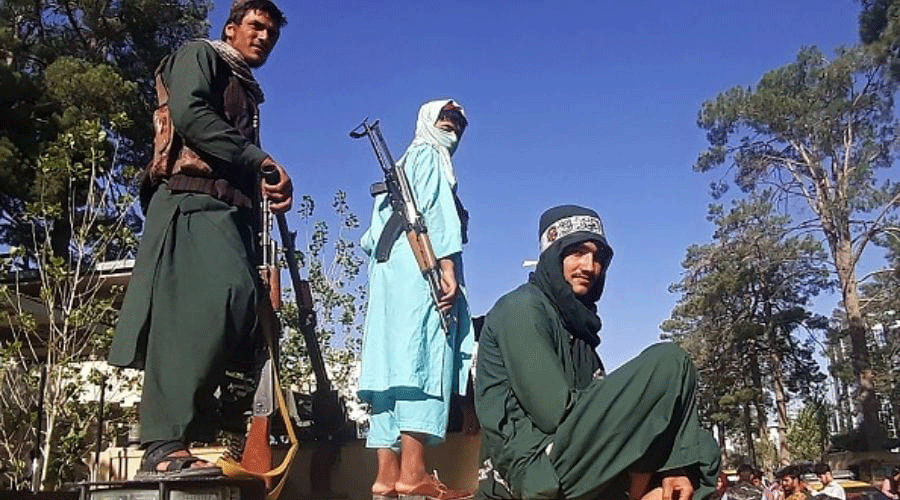In the first formal and publicly acknowledged contact, Indian Ambassador to Qatar Deepak Mittal met senior Taliban leader Sher Mohammad Abbas Stanekzai on Tuesday and conveyed India's concerns that Afghanistan's soil should not be used for anti-Indian activities and terrorism.
The Ministry of External Affairs (MEA) said the discussions also focused on the safety, security and early return of Indian nationals stranded in Afghanistan and the travel of Afghan nationals, especially members of minority communities to India.
The meeting took place at the Indian embassy in Doha at the request of the Taliban side and came two weeks after the outfit seized control of Kabul.
The MEA said the Taliban representative assured the ambassador that "these issues" would be positively addressed.
"Today, Ambassador of India to Qatar, Deepak Mittal, met Sher Mohammad Abbas Stanekzai, the head of Taliban's Political Office in Doha. The meeting took place at the Embassy of India, Doha, on the request of the Taliban side," the MEA said in a statement.
It said the discussions focused on safety, security and early return of Indian nationals stranded in Afghanistan and the travel of Afghan nationals, especially minorities, who wish to visit India also came up.
"Ambassador Mittal raised India's concern that Afghanistan's soil should not be used for anti-Indian activities and terrorism in any manner.
People familiar with India's ties in Afghanistan said it was the first publicly acknowledged contact between the two sides in over at least two decades.
External Affairs Ministry Spokesperson Arindam Bagchi, replying to questions during his weekly briefing in the last few months on whether India has reached out to the Taliban, has been maintaining that New Delhi is in touch with all stakeholders.
It was learnt that India had opened a channel of communication with the Taliban but it was never acknowledged officially.
The meeting between Mittal and Stanekzai took place hours after the US completed the withdrawal of its troops from Afghanistan, ending its 20-year-long military campaign in the country.
The last American aircraft left the Kabul airport in the early hours of Tuesday.
On Saturday, Stanekzai, in a clear overture, described India as an important country in the region and said the Taliban wants to maintain Afghanistan's trade, economic and political relations with it.
"We attach great importance to our trade, economic and political relations with India and want to maintain that relation," he had said.
"We also need to keep the air trade open," the Taliban leader was quoted as saying by Pakistani media outlet Independent Urdu.
He was referring to the air corridor between India and Afghanistan that was established to boost trade between the two countries in view of Pakistan's denial to allow transit access.
External Affairs Minister S Jaishankar on August 20 held talks with his Qatari counterpart Sheikh Mohammed bin Abdulrahman Al-Thani on the Afghan crisis during a stopover in Doha on his way back home from a four-day visit to the US.
Doha has been the venue for the intra-Afghan peace talks and the Gulf country has emerged as a crucial player in facilitating the Afghan peace process.
Political leaders of the Taliban have been residing in Qatar for years.
In September last year, an Indian delegation attended the inaugural ceremony of the intra-Afghan negotiations featuring various stakeholders including the Afghan government and the Taliban in Doha. Jaishankar had joined it through a video conference.
Meanwhile, a high-level group comprising Jaishankar, NSA Ajit Doval and a number of other senior officials is focusing on India's immediate priorities in Afghanistan following the drawdown of American forces from the country.
Official sources said on Tuesday that the group has been meeting regularly over the last few days following a direction from Prime Minister Narendra Modi.
India's immediate priorities include the safe return of its nationals still in Afghanistan, bringing back the Afghan nationals who stood by New Delhi and ensuring that Afghan soil is not used for terrorism directed at it.
"In view of the evolving situation in Afghanistan, Prime Minister Modi recently directed that a high-level group comprising of External Affairs Minister, the National Security Adviser and senior officials focus on the immediate priorities of India," said a source.
"It is seized of issues pertaining to the safe return of stranded Indians, the travel of Afghan nationals (especially minorities) to India, and assuring that the territory of Afghanistan is not used in any manner for terrorism directed against India," it said.
India has been a key stakeholder in Afghanistan and it has invested nearly USD 3 billion in carrying out nearly 500 projects across Afghanistan.
India has been in touch with all major regional players including those in the Gulf region on the developments in Afghanistan.
The UN Security Council, under India's presidency, on Monday adopted a resolution demanding that the territory of Afghanistan not be used to threaten any country or shelter terrorists.
There have been mounting concerns in India over the possibility of rise in activities of various terror groups including Lashkar-e-Toiba and Jaish-e-Mohammed from Taliban-controlled Afghanistan.











